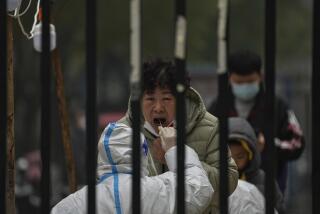The Reluctant Reform Dragon
- Share via
A surprisingly widespread school of diplomatic pessimism advertising itself as realism claims that the post-Cold War world is both more complex and more dangerous than the Cold War world. In fact, it is neither. Any environmental problem that now threatens would be only that much greater if nuclear holocaust also threatened. Any ethnic or local political conflict would be only that much greater if superpowers were arming the combatants.
True, the power of the United States, too often characterized as the one remaining superpower, is not what it once was. But what matters more is that the power of the Western, democratic, free-market ideal of which the United States is the most spectacular example has never been greater. The developments of the last week serve to underscore this. Even as the Israel-PLO treaty pushed the entire Middle East a large step toward adherence to this ideal, China was taking a smaller--but, alas, almost comical--step in the same direction. The 15-year imprisonment of Wei Jingsheng, 43, a dissident internationally admired for his courage at the time of China’s brief “Democracy Wall” experiment, is about to end. Rumored at different times to have died or lost his mind in captivity, Wei seems alive and well. His story will almost certainly have a happy ending.
Comedy of another sort attends the inability of the Chinese authorities to quite release the man whose release they have announced in the clear hope of favorably impressing the International Olympic Committee, which is soon to rule on their application to host the Games in the year 2000. Wei is free, they said; but where is he? His family has seen him but apparently has not been permitted to speak to him. He could only hand relatives a note saying, outlandishly, that he was “resting.” The Chinese run a risk, obviously, in restoring outward freedom to a man who has never lost his inward freedom. Like some of the great Soviet dissidents, Wei has what we might call, for the occasion, Olympic stubbornness; a more “cooperative” attitude would have won him an earlier release. The Chinese were running a greater risk in keeping him locked up.
The moral is that the cost of tyranny is becoming prohibitive. And the world, not to minimize other problems, is both safer and, at least politically, simpler as a result.
More to Read
Go beyond the scoreboard
Get the latest on L.A.'s teams in the daily Sports Report newsletter.
You may occasionally receive promotional content from the Los Angeles Times.






